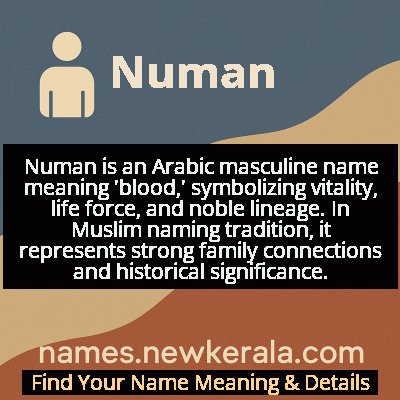Numan Name Meaning & Details
Origin, Popularity, Numerology Analysis & Name Meaning of Numan
Discover the origin, meaning, and cultural significance of the name NUMAN. Delve into its historical roots and explore the lasting impact it has had on communities and traditions.
Name
Numan
Gender
Male
Origin
Muslim
Lucky Number
9
Meaning of the Name - Numan
Numan is an Arabic masculine name meaning 'blood,' symbolizing vitality, life force, and noble lineage. In Muslim naming tradition, it represents strong family connections and historical significance.
Numan - Complete Numerology Analysis
Your Numerology Number
Based on Pythagorean Numerology System
Ruling Planet
Mars
Positive Nature
Generous, passionate, energetic, and humanitarian.
Negative Traits
Impulsive, impatient, moody, and can be overly emotional.
Lucky Colours
Red, maroon, scarlet.
Lucky Days
Tuesday.
Lucky Stones
Red coral, garnet.
Harmony Numbers
1, 2, 3, 6.
Best Suited Professions
Military, sports, philanthropy, leadership roles.
What People Like About You
Courage, energy, leadership, generosity.
Famous People Named Numan
Numan I
Historical Ruler
Founded the Lakhmid dynasty and established a powerful Arab kingdom
Numan ibn al-Mundhir
Poet and Ruler
Last Lakhmid king, patron of Arabic poetry, subject of famous Arab love stories
Numan Kurtulmuş
Politician
Deputy Prime Minister of Turkey and influential Islamic political leader
Numan Maqbul
Cricketer
Represented Pakistan in international cricket as a professional batsman
Name Variations & International Equivalents
Click on blue names to explore their detailed meanings. Gray names with will be available soon.
Cultural & Historical Significance
Extended Personality Analysis
Individuals named Numan typically exhibit strong leadership qualities combined with deep emotional intelligence, making them natural leaders who understand and connect with people on a profound level. Their name's association with 'blood' often manifests as intense loyalty to family and community, a protective nature, and a strong sense of responsibility toward those in their care. They tend to be passionate and determined, approaching life with vigor and purpose that inspires others. Many Numans display a unique blend of traditional values and progressive thinking, allowing them to honor heritage while adapting to modern circumstances. Their emotional depth can make them both fiercely compassionate and strongly principled, often taking stands for what they believe is right. While they can be intense in their convictions, they typically balance this with practical wisdom and the ability to build consensus, making them effective in both personal relationships and professional settings where leadership and diplomacy are required.
Modern Usage & Popularity
In contemporary naming practices, Numan maintains steady popularity across Muslim communities worldwide, particularly in Turkey, Pakistan, Arab nations, and among Muslim diaspora populations in Europe and North America. The name has adapted to modern contexts through spelling variations like Nouman and Noman, which accommodate different linguistic preferences while preserving the name's essential character. Its usage reflects a balance between traditional Islamic values and modern practicality, as the name is relatively easy to pronounce in multiple languages while carrying significant historical and cultural weight. Unlike some names that experience dramatic popularity swings, Numan has maintained consistent usage as a respected classic rather than a fleeting trend. This stability suggests its enduring appeal to parents seeking names that honor Islamic and Arab heritage while remaining accessible in global contexts. The name's strong historical associations with leadership and nobility continue to make it an attractive choice for families valuing these qualities.
Symbolic & Spiritual Meanings
Symbolically, Numan represents the vital life force and continuity of heritage through its primary meaning of 'blood.' It embodies the interconnectedness of past, present, and future generations, symbolizing the unbroken chain of family lineage and cultural tradition. The association with red blood connects to themes of passion, courage, and the essential vitality that drives human endeavor and survival. Metaphorically, the name signifies the deep roots that anchor individuals to their ancestral heritage while also representing the flowing continuity that carries cultural values forward through time. It suggests both the sacrifice required to protect what matters and the life-giving bonds of kinship and community. In Islamic contexts, the name additionally carries connotations of noble leadership and historical significance, referencing the respected figures who bore this name throughout Arab and Muslim history. The symbolic weight makes Numan a name that speaks to enduring values, cultural preservation, and the dynamic interplay between individual identity and collective heritage.

